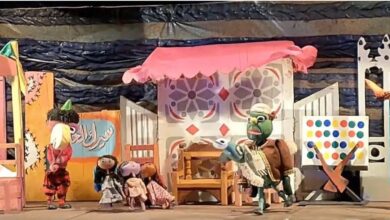As Egyptians get ready for the holy month of Ramadan on Monday, TV production companies continue their annual competition for viewing figures. For decades now, Ramadan has been regarded as the optimal time for screening new TV dramas, as families gather in their living rooms each evening to watch TV while they break the fast.
With protests continuing and several iftars and sohours organized at Tahrir Square, TV schedulers seem to have made few changes in the range of subject matter and genres on offer.
One obvious change, however, is the decline in the number of dramas, from over 50 to a mere 32 – which is still a lot, given the nine hours between dusk and dawn, during which they are screened back to back.
Another change is the absence of a number of stars, who have become symbols of Ramadan drama, such as actress Elham Shaheen. She was due to star in "The case of her Excellemcy, the Minister", but the production company failed to obtain the necessary permits to film in a number of government buildings, including as the Ministries of Interior and Tourism.
Otherwise, viewers can expect the usual genres of biographical and social dramas. With the exception of drama “One Hand”, which is the work of several new young actors, most TV serials seem to have refrained from talking about the 25 January revolution.
Among the crop of biopics this year, Lebanese actress and singer Carole Samaha is profiling Sabah – an iconic singer whose music and acting career stretches from the ‘40s to the present – in “Al-Shahroura”, which is Sabah's nickname.
“A Man for this Era”, showing the life of Egyptian mathematician and physicist Ali Mustafa Musharafa, provides something unique in the biographical genre. Musharafa was the first Egyptian and the 11th person worldwide to complete a PhD in science. He is believed to have been killed in 1950 by Israel's Mossad spy agency.
TV director In'am Mohammed Ali, who had great success with a biographical series on Egyptian singer Om Kalthoum and another on the Arab world’s first feminist, jurist Qassem Amin, describes “A Man for this Era” as a necessary step toward highlighting the importance of scientists, especially after the January uprising.
"Al-Rayan" seems like another interesting drama. Profiling businessman Ahmed Al-Rayan – the founder of one of Egypt’s most notorious pyramid schemes – “Al-Rayan” also talks about the social impact of his company. Al-Rayan, played by Khaled Saleh, was convicted of fraud in 1989 for a scam involving billions of Egyptian pounds and imprisoned for 22 years. His company, which offered interest rates far higher than banks and adopted the disguise of an Islamic institution, tempted thousands of Egyptian depositors to invest.
The story ends tragically, with the company going bankrupt and depositors recouping their money in the form of electronic appliances like refrigerators and TVs.
Female protagonists have a strong presence in this year’s Ramadan dramas, including “Samara”, starring Ghada Abdel Razek and Loussy, and "Women Wit”, starring Somaia al-Khashab and Fifi Abdou.
Some dramas are also based on well-known novels, such as “Valley of the Kings”, starring al-Khashab and Sabreen and based on “Cloudy Day on the West Side” by Mohammed al-Mansy Kandeel.
"Back Streets” is based on Abdel Rahman al-Sharqawy's novel of the same title and stars Syrian actor Gamal Soliman.
A number of sequels are continuing this season, including season eight of the sitcom “A Man and Six Women”, part two of “Who is Mama's Husband?”, part three of “Al-Dali”, and the comedy show “The Grand One”, starring Ahmed Mekky.
Some popular film stars are joining the fray this year, appearing in various Ramadan dramas. Among them is singer and actor Tamer Hosny, who appeared in tears on a Youtube video in February, having just been kicked out of Tahrir Square by protesters. Now he is back in the public eye in a more dignified role, staring in his first TV drama, “Adam”. Hosny plays the role of a poor young man who supports his family after his father's death. Mai Ezz Eldin costars in “Adam” as his Christian friend, while Tunisian actress Dorra plays his girlfriend.
Comedic film star Mohammed Henedy makes his first TV experience with "Monsieur Ramadan Mabrouk Abu al-Alamein", a comedy series written by Youssef M'aty and directed by Sameh Abdel Aziz.
Two series will tackle the Arab-Israeli conflict. “Abed Karman” tells the story of a Palestinian spy who worked with the Egyptian government and was able to get important maps via his intelligence network in Israel. “I'm Jerusalem”, meanwhile, covers a rather longer historical period, from Ottoman times up to the present, prompting viewers to give more attention to the Palestinian cause.
Building on the success of his series last year, Amr Saad stars in “Abdel-Aziz Street”, in which he plays a poor worker in the famous Downtown commercial center. The series follows his journey from working as a shopkeeper to his successful life as a rich businessman.
Starring Nicole Saba and Youssef al-Sharif, “Nour Mariam” is another series that received a lot of attention during shooting, as it highlights corruption in the Mubarak era.
The most controversial drama in this year’s Ramadan season is “Al-Hassan, Al-Hossain, and Mo'aweya”, which features one of the most critical times in Islamic history. Al-Azhar has issued a statement demanding the banning of the drama on the grounds that portraying Prophet Muhammed’s grandsons and companions is forbidden. Produced by the Kuwaiti Production and Distribution Company, which is also producing a drama on the life of Muslim Brotherhood founder Hassan al-Banna, controversy over its screening continues.
Popular actor Yehya al-Fakharrany appears this year in a rather novel way, featuring in “Animal Stories in the Quran”, a cartoon based on a book by Ahmed Bahgat. He was planned to star in a biographical drama about Albanian Khedive Muhammed Ali, whose dynasty ruled Egypt until the 1952 revolution. However, the series has been postponed due to funding problems.
For those wanting to take a break from the continuous diet of political talk shows and newsreels, Ramadan dramas will offer some relief, while continuing to touch on the social and cultural contexts from which the revolution emerged.




